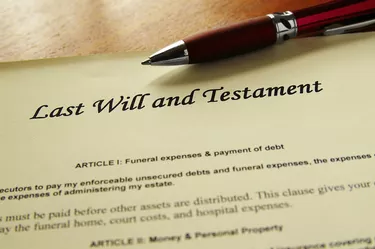
An estate executor is responsible for completing an inventory and appraisal, most often within 30 to 90 days of a decedent's death. The inventory must both list assets and include a description and fair market valuation for real estate, personal property, bank accounts and the decedent's debts. Full disclosure is vital, because the court, heirs and creditors use the information for inheritance, tax and debt repayment purposes.
Getting Started
Video of the Day
In most states, the probate court will send you a blank inventory form with the decree and certificate showing that you are the estate's executor. Otherwise, download and print the form available on the state or county court website. If there is a will, review it before getting started, because you don't have to inventory any jointly owned assets or any assets the decedent disposed of in a will. When you record inventory assets, list appraised items and financial accounts separately, but list and value common personal property in one lump sum.
Video of the Day
Gather Asset Information
You'll need vehicle titles, real estate deeds, and bank and investment account numbers for any asset owned solely by the decedent. Search through the decedent's financial records and review the will, income tax returns and bank accounts to locate financial information. Work with an attorney to get copies of any missing records. Search for and list any missing personal assets. According to Cary A. Lind of the Lind Law Firm, an attorney can help you find and recover valuable items, but unless you know who has possession of less-valuable assets, it might not be worth the time and expense required to pursue recovery.
Record Cash Assets
Record each item in its proper section on the inventory form. Most include separate sections for personal property and real estate. For cash assets, list the name of the financial institution, the account type and number, along with the dollar value of each account as of the date of death, or in some states, the date of your appointment as executor. Review instructions carefully, as some states may require full account numbers, while others may require only the last four digits.
Record Non-cash Assets and Real Estate
According to Jennifer MacDonnell of The Paralegal Society, many states will appoint an appraiser to value non-cash assets, including real estate and specialty items such as jewelry, vehicles, art and antiques. However, even if you are not responsible for valuing these items on your own, you can still include independent appraisals to assist the court-appointed appraiser. For real estate assets, list the address and provide a full legal description, along with the parcel number. Describe other non-cash assets as fully as you can.